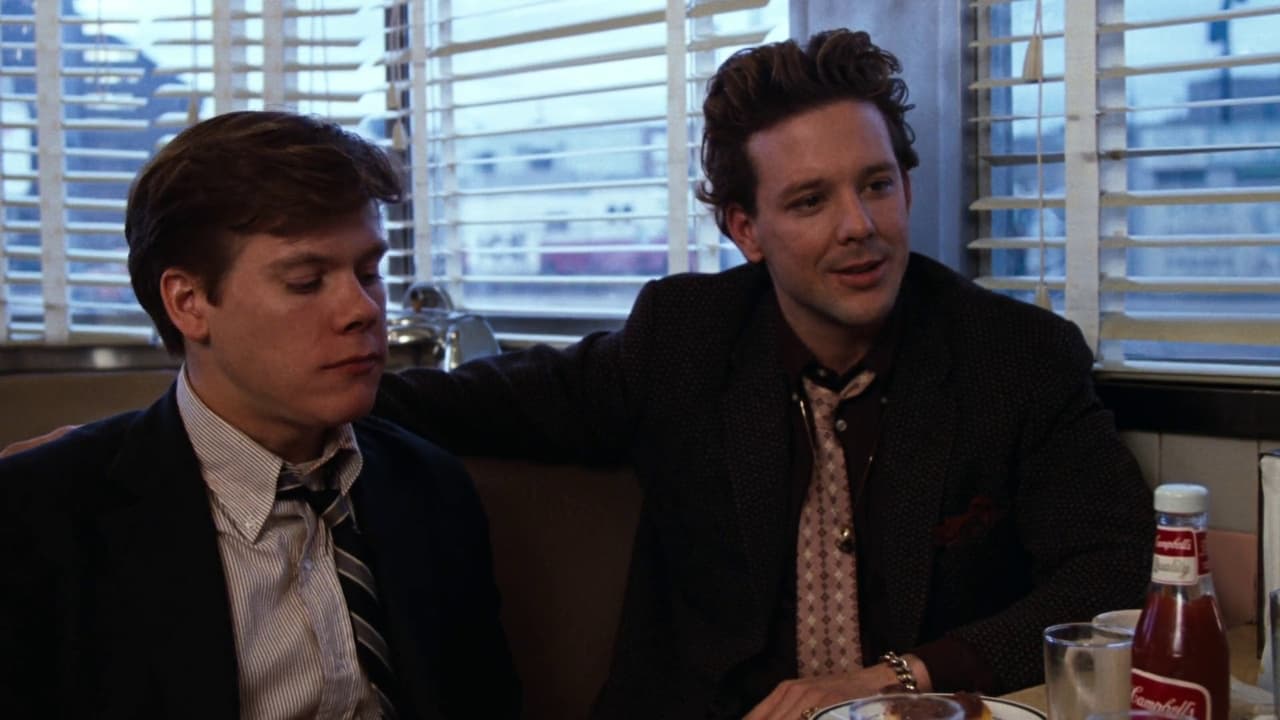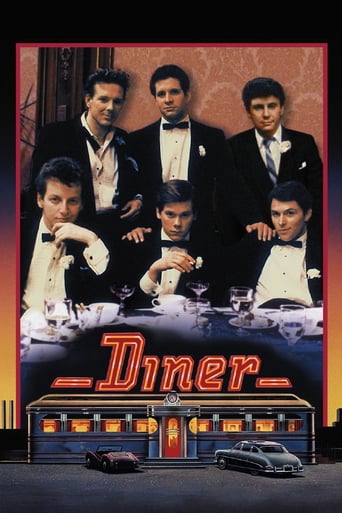framptonhollis
For whatever reason in recent years, "Diner" seems to have been overshadowed by a disturbing cloud of obscurity. While it is a film that received great acclaim for those who have seen it, and from my point of view it is a guaranteed audience pleaser, not too many people seem to know of this 80's gem. Essentially, "Diner" is a film in the same vein as "American Graffiti" and "Dead Poets Society", except the characters are a bit older and are now forced to reckon with the frightening forces of reality. While it is a hilarious and witty comedy, "Diner" is also a powerful portrait of a group of old friends now struggling to adjust to adulthood and societal expectations. Concepts such a marriage and maturity are now at last taking their dramatic grasp upon this group of charmers who are now facing challenges they never thought were possible.Dealing frankly with relationships, sexuality, stress, and the sometimes scary idea of "settling down" with a wife, job, and kids, "Diner" is a brilliant peek into the lives of a group of witty and entertaining friends as their age unexpectedly increases, forcing the task of adulthood to begin, truly affecting their lives with storms of conflict and confusion.
namashi_1
Barry Levinson's 'Diner' celebrates the spirit of friendship & relationships. Written with heart, Directed with precision & Performed Superbly, this 1982-classic is Pure Magic! 'Diner' Synopsis: A group of college-age buddies struggle with their imminent passage into adulthood in 1959 Baltimore.I loved 'Diner', right from the start to the end. The narrative moves at a tremendous pace and the human-conflict among its primary characters, is infectious. Levinson's Screenplay concentrates on the true essence of friendship & the relationships we share with people in society. Also, the energy of Baltimore has been depicted most efficiently.Levinson's Direction is excellent. He deserves distinction marks for his wonderful work here. Cinematography by Peter Sova is fabulous. Editing by Stu Linder is very well-done.Performance-Wise: Mickey Rourke delivers a sensational, stunning performance. He enacts his part with remarkable conviction. Steve Guttenberg is unflinchingly good. Daniel Stern is natural to the core. Kevin Bacon is terrific, yet again! What a phenomenal actor! Tim Daly is first-rate. Ellen Barkin is fantastic & to a large-extend, the scene-stealer. On the whole, 'Diner' has everything going for it. Its got heart & soul! Don't miss it!
jzappa
Unsullied, well-acted and lively American movies by new directors with the audacity of their assurance are in danger of becoming extinct because they're either few in numbers, or threatened by changing environmental or predation parameters. They ought to be defended and preserved, not to mention valued and treasured. This naturalistically acted movie isn't extravagant or lengthy, but it's the kind of minor, truthful, enjoyable movie that should never go out of fashion, even now that the tradition of sequels and blockbusters has been thoroughly established. It's not quite seamless, yet its intermittent patchiness is part of its allure. There's an exhilaration in watching a gifted hatchling filmmaker skate on thin ice.This wistful, charismatic sleeper sounds initially like a genre movie in the always trendy Stand by Me While I Look Dazed and Confused at American Pie and/or Graffiti at Ridgemont High pattern. Like American Graffiti, or like Porky's, etc., it's set in a youth-driven bygone era marked by perpetual nostalgia, routinely revisits some favorite place and highlights young men moving toward maturity while talking relentlessly about sex, to the jingle of a ceaseless line of hit records.Yet the similitude stops there. One of the most sensitive youth accounts about the vacuum between genders, it's a lot less blithe than any of its foils. The ambiance is reverberated by the set design, which is actually rather gritty and dingy. In just one crucial scene do two characters find themselves beyond Baltimore's worn boundaries, and amidst a vast, sunlit countryside in a well-heeled hamlet. Riding horseback past them is an advantaged, beautiful girl. "You ever get the feeling that there's something going on that we don't know about?" one character asks the other, and then they zip right back to the movie's dim daily backdrop.Barry Levinson, the film's writer and director, almost treads more Mean Streets-style water with such strokes, and those are actually the few scenes that seem to slightly miscarry, forthright as they are. But Levinson's sentiment for and interest in his young-at-heart characters are distinctive. And his immoderation, like theirs, is effortlessly absolved.His tribute to the fine art of screen writing is about a cluster of high-school buddies who, in 1959, are a year or two graduated, and now starting to belatedly come into their own. Shrevie has already tumbled into an early marriage with a woman with whom, he entrusts to a chum, he cannot have a meaningful exchange. Sex is no longer a god to him, but he's already melancholy for the time when it was. His wife Beth, rendered very movingly in only a few scenes in Ellen Barkin's first big-screen role, knows him so little that she cannot even fathom something as essential and imperative as how he keeps his records categorized. At the end of a lingering marital clash in which he has berated Beth about the LPs, Shrevie, intending to express his recollection for details, roars at Beth that Ain't That a Shame was playing when he first met her in 1955.Another of the boys, Eddie, is about to wed a girl whom we incessantly hear about though never see. Eddie's such a Baltimore Colts devotee that he's asserting that their colors be the theme for the wedding. He's such an anxious bridegroom that he's requiring Elyse score higher than 65 on a sports quiz of Eddie's own design. If Elyse fails, he declares, wedding's off. He's for real. What'll he do when she scores 63? The other leads are self-indulgent, ill-mannered trust-fund rebel Fenwick, who, in one remarkable private scene shows an uncannily encyclopedic intellect; persuasive charmer Boogie, who gambles on everything, counting his sex life and who works as a beautician though scores better with chicks if he tells them he's studying law, and Timothy Daly's smartly played polite, square-shooting collegian Billy, who can't convince his pregnant girlfriend to marry him. These characters are well drawn on their own individual merits, and they're played stunningly. Levinson unearthed a top-quality cast, most of them no-names but few for long.Guttenberg and Stern had previous film experience, though neither played such rich characters as Shrevie and Eddie before. Kevin Bacon, who thus far had any been teen #2 and annoying jock #1 in a handful of slasher flicks and frathouse rom-coms, makes Fenwick a remarkable fusion of indulgence and despair. Rourke gives one of the best of his many memorable performances. Low-key and crafty, his shiftless Boogie also ends up being arguably the most good-natured character, and Rourke makes his gentleness feel engaging and genuine.Levinson fluctuates the movie's temper greatly from scene to scene. Some sequences, like one at a strip club, where two of the boys get the band to play lively jazz and everyone begins bopping, are wholesome whimsy, and don't quite feel like anything else. Others, as when the group sits quarrelling over who's better between Sinatra or Mathis, have a gracefully authentic ordinariness. So does a scene in which Shrevie, who works in a TV shop, attempts to sway one patron to buy a color set, although the man claims he once saw Bonanza in color and the Ponderosa looked faked. Levinson isn't above sending his characters to see Troy Donahue and Sandra Dee at a local movie house, either. The melancholy characteristic of his material is engaged to its maximum degree.However Diner has a lot more to it than that, and it doesn't seem to aspire to the calculated dependability that other, likewise constructed movies are after. Levinson isn't simply a fuddy-dud with an affectionate or comprehensive reminiscence for his own youth. He's someone trying to grasp that era, not just to evoke it. Indeed, Diner is ultimately a film we can all understand on a universal level.
ProfessorFate
Not much happens in the course of director Barry Levinson's film "Diner". A bunch of college-aged guys in late 1950's Baltimore gather over the Christmas holidays and eat french fries with gravy at their favorite local diner and talk about "stuff" . . . oh yeah, they also confront the painful necessity of making the transition from carefree adolescence to the responsibilities of adulthood.The reason for the gathering: Eddie (Steve Guttenberg) is getting married. TV salesman Shrevie (Daniel Stern) is already married and prefers to cling to his single friends lifestyle instead of trying to understand his wife, Beth (Ellen Barkin). Fenwick (Kevin Bacon) is the smart and cynical black sheep son of a rich family, who seems to have a drinking problem. Boogie (Mickey Rourke) is a hairstylist/law student and a smooth-talking ladies man, but his mounting gambling debts are getting him into trouble. Billy (Timothy Daley) has escaped to college and gotten involved in a messy romance with a longtime platonic girlfriend. Then there's Modell (Paul Reiser), the soft-spoken philosopher/comedian of the group, who ponders the meaning of the word "nuance" and, in the film's funniest scene, torments Eddie over a roast beef sandwich. Eddie himself is a lazy, immature-yet-amiable lout who is making his bride-to-be pass a football quiz before tying the knot. The interaction between these friends sets in motion a story that is as deep as the meaning of life, and as shallow as the question of who's the better singer - Sinatra or Mathis? "Diner" is simply one of the best movies ever made about male-bonding. Working from a highly autobiographical script, director Barry Levinson has created a masterful comedy and an insightful character study. What he does so well is capture the way guys act when women aren't around - they smoke and drink and stay up all night and laugh and talk about cars and music and sports, and of course they rack their brains trying to figure out the opposite sex. Any woman wanting to understand the male psyche would do well to study this film.More importantly he also perfectly captures the feeling of inevitable change hanging over these characters. There's this wistful desire to hang on to past relationships, to revel in familiar people and places before moving forward, before dealing with the anxiety of the approaching unknown. It's this quality that makes "Diner" such a special film. It can be enjoyed on a surface level for it's humor and nostalgia, or you can dig deeper and appreciate the profound observations it makes on the human condition. Either way it is an amazing film.

